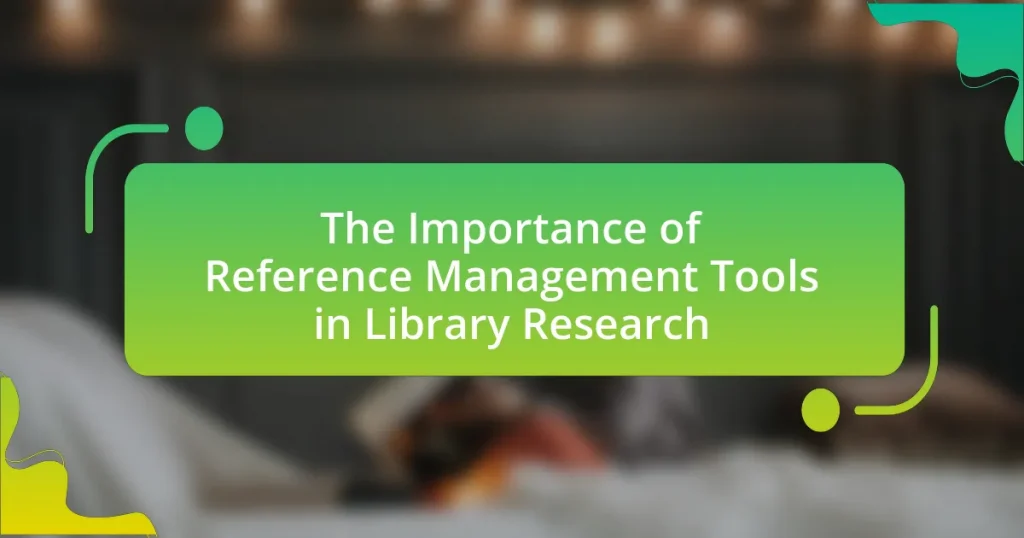Reference management tools are essential software applications that assist researchers in organizing, storing, and citing bibliographic information effectively. These tools streamline citation management, allowing researchers to focus on content creation while minimizing errors and saving time. Key features include automatic citation generation, organization of references, and collaboration capabilities, which enhance research productivity and accuracy. The article explores the functionality of these tools in library research, their impact on the writing process, and best practices for maximizing their effectiveness, while also addressing common challenges users may face.

What are Reference Management Tools and Why are They Important in Library Research?
Reference management tools are software applications that help researchers organize, store, and cite their references and bibliographic information efficiently. These tools are important in library research because they streamline the process of managing citations, allowing researchers to focus on content creation rather than formatting references. For instance, tools like EndNote and Zotero enable users to automatically generate citations in various styles, reducing the risk of errors and saving time. Additionally, they facilitate collaboration among researchers by allowing easy sharing of references and notes, which enhances the overall research process.
How do Reference Management Tools function in the context of library research?
Reference management tools function by organizing, storing, and citing bibliographic information in library research. These tools allow researchers to collect references from various sources, such as databases and online catalogs, and manage them in a centralized location. For instance, tools like Zotero and EndNote enable users to create bibliographies automatically in multiple citation styles, streamlining the writing process. Additionally, they facilitate collaboration by allowing researchers to share references and notes with peers, enhancing the efficiency of group projects. The effectiveness of these tools is supported by studies indicating that they significantly reduce the time spent on citation management, thus improving overall research productivity.
What features do Reference Management Tools typically offer?
Reference Management Tools typically offer features such as citation generation, organization of references, and collaboration capabilities. These tools enable users to automatically format citations in various styles, such as APA or MLA, which streamlines the writing process. Additionally, they allow users to categorize and store references in a structured manner, making it easier to retrieve and manage sources. Collaboration features enable multiple users to work on shared projects, facilitating teamwork in research efforts. These functionalities enhance efficiency and accuracy in managing bibliographic data, which is essential for effective library research.
How do these features enhance the research process?
Reference management tools enhance the research process by streamlining the organization and citation of sources. These tools allow researchers to efficiently collect, manage, and format references, which reduces the time spent on administrative tasks and minimizes errors in citations. For instance, a study published in the Journal of Academic Librarianship found that using reference management software can increase productivity by up to 30%, as researchers can focus more on content creation rather than formatting. Additionally, these tools often integrate with word processors, enabling seamless insertion of citations and bibliographies, which further enhances the accuracy and professionalism of research outputs.
What role do Reference Management Tools play in organizing research materials?
Reference Management Tools play a crucial role in organizing research materials by enabling researchers to efficiently collect, manage, and cite their sources. These tools streamline the process of organizing bibliographic information, allowing users to categorize references, annotate documents, and generate citations in various formats automatically. For instance, tools like Zotero and EndNote facilitate the storage of PDFs and web pages, making it easier to retrieve and reference materials during the writing process. Studies have shown that using such tools can significantly reduce the time spent on citation management, enhancing overall research productivity and accuracy.
How do these tools assist in citation management?
Citation management tools assist in organizing, storing, and formatting references efficiently. These tools enable users to collect citations from various sources, such as books, articles, and websites, and categorize them for easy retrieval. They also automate the formatting of citations and bibliographies in multiple styles, such as APA, MLA, and Chicago, ensuring accuracy and consistency. Research indicates that using citation management tools can significantly reduce the time spent on formatting references, allowing researchers to focus more on content creation and analysis. For instance, a study published in the Journal of Academic Librarianship found that 85% of users reported improved efficiency in managing citations when using these tools.
What methods do they use to categorize and store references?
They use various methods to categorize and store references, including tagging, hierarchical organization, and database management systems. Tagging allows users to assign keywords to references for easy retrieval, while hierarchical organization structures references into categories and subcategories, facilitating navigation. Database management systems, such as EndNote or Zotero, provide robust frameworks for storing, organizing, and retrieving references efficiently, often incorporating features like search functions and citation generation. These methods enhance the efficiency of reference management, making it easier for researchers to access and utilize their sources effectively.
Why is it essential to use Reference Management Tools in academic writing?
Reference Management Tools are essential in academic writing because they streamline the organization and citation of sources, ensuring accuracy and consistency. These tools help researchers manage bibliographic data and generate citations in various formats, reducing the risk of plagiarism and enhancing the credibility of academic work. Studies show that proper citation practices, facilitated by these tools, can significantly improve the quality of research outputs and the efficiency of the writing process. For instance, a survey by the American Psychological Association found that 70% of researchers reported increased productivity when using reference management software.
How do these tools improve the accuracy of citations?
Reference management tools improve the accuracy of citations by automating the formatting and organization of references according to specific citation styles. These tools utilize databases and algorithms to ensure that citations are consistent and adhere to guidelines set by various style manuals, such as APA, MLA, or Chicago. For instance, tools like Zotero and EndNote automatically generate citations from user-inputted data, reducing human error associated with manual entry. Studies have shown that using reference management software can decrease citation errors by up to 50%, thereby enhancing the reliability of academic work.
What impact do they have on the efficiency of the writing process?
Reference management tools significantly enhance the efficiency of the writing process by streamlining citation and organization tasks. These tools automate the generation of citations and bibliographies, reducing the time spent on formatting and ensuring accuracy in referencing. For instance, studies have shown that using reference management software can cut the time needed for managing references by up to 50%, allowing writers to focus more on content creation rather than administrative tasks. This efficiency not only accelerates the writing process but also improves the overall quality of academic work by minimizing errors in citations.
How can Reference Management Tools facilitate collaboration among researchers?
Reference management tools facilitate collaboration among researchers by providing a centralized platform for organizing, sharing, and citing references. These tools enable multiple users to access and edit shared libraries, ensuring that all collaborators have the most up-to-date information. For instance, tools like Zotero and Mendeley allow researchers to annotate documents, leave comments, and track changes, which enhances communication and coordination among team members. Additionally, these tools often integrate with word processors, streamlining the citation process and reducing errors, thereby improving the overall efficiency of collaborative research efforts.
What features support shared access to research materials?
Features that support shared access to research materials include collaborative tools, cloud storage, and version control. Collaborative tools enable multiple users to work on the same document simultaneously, enhancing teamwork and information sharing. Cloud storage allows researchers to store and access materials from any location, facilitating easy sharing among team members. Version control tracks changes made to documents, ensuring that all collaborators are working with the most current information and can revert to previous versions if necessary. These features collectively enhance the efficiency and effectiveness of research collaboration.
How do these tools enhance communication among team members?
Reference management tools enhance communication among team members by providing a centralized platform for sharing and organizing research materials. These tools facilitate real-time collaboration, allowing team members to annotate, comment, and discuss references directly within the platform. For instance, tools like Zotero and Mendeley enable users to create shared libraries, ensuring that all members have access to the same resources and can contribute to discussions efficiently. This centralized access reduces miscommunication and ensures that everyone is on the same page regarding the research materials being utilized, ultimately streamlining the research process.
What are the common challenges faced when using Reference Management Tools?
Common challenges faced when using Reference Management Tools include difficulties in importing references, managing duplicates, and ensuring accurate citation formatting. Users often encounter issues with importing references from various databases, which can lead to incomplete or incorrect data. Additionally, managing duplicates can be cumbersome, as many tools do not automatically detect and merge duplicate entries, resulting in cluttered libraries. Furthermore, ensuring that citations adhere to specific formatting styles can be problematic, especially when tools do not consistently apply the required guidelines. These challenges highlight the need for users to invest time in learning the functionalities of these tools to maximize their effectiveness in library research.
How can users overcome technical difficulties with these tools?
Users can overcome technical difficulties with reference management tools by utilizing available support resources, such as user manuals, online tutorials, and customer service. These resources provide step-by-step guidance and troubleshooting tips that can help users navigate common issues. For instance, many tools offer comprehensive FAQs and community forums where users can find solutions to specific problems encountered during use. Additionally, regular software updates often address bugs and improve functionality, so keeping the tool updated is essential for optimal performance.
What strategies can be employed to maximize the effectiveness of Reference Management Tools?
To maximize the effectiveness of Reference Management Tools, users should adopt strategies such as organizing references systematically, utilizing tagging and categorization features, and regularly updating the database. Systematic organization allows for easy retrieval of sources, while tagging enhances searchability and categorization aids in grouping related materials. Regular updates ensure that the reference list remains current and comprehensive, which is crucial for maintaining academic integrity and relevance in research. Studies indicate that effective organization can significantly reduce time spent on literature reviews, thereby improving overall research efficiency.
What best practices should researchers follow when utilizing Reference Management Tools?
Researchers should consistently organize their references, ensuring accurate citation and easy retrieval. This involves categorizing references by themes or projects, which enhances efficiency during the writing process. Additionally, researchers must regularly update their reference libraries to include the latest sources, as this practice ensures comprehensive literature coverage. Utilizing the features of reference management tools, such as tagging and note-taking, can further streamline the research process. Studies indicate that effective use of these tools can significantly reduce the time spent on citation formatting and improve overall research productivity.
How can researchers ensure they are using these tools effectively?
Researchers can ensure they are using reference management tools effectively by familiarizing themselves with the software’s features and functionalities. Understanding how to organize citations, generate bibliographies, and collaborate with peers enhances the research process. For instance, studies show that researchers who utilize these tools can save up to 30% of their time on citation management, allowing them to focus more on content creation and analysis. Additionally, attending training sessions or webinars on specific tools can further improve their proficiency and application in research tasks.
What tips can enhance the overall research experience with Reference Management Tools?
To enhance the overall research experience with Reference Management Tools, users should consistently organize their references and utilize features such as tagging and categorization. Organizing references allows for easier retrieval and management of sources, which is crucial for maintaining a structured research process. Utilizing tagging and categorization features helps in quickly locating relevant materials, thereby saving time and increasing efficiency. Additionally, regularly updating the reference library with new sources ensures that researchers have access to the latest information, which is vital for producing high-quality work. Studies have shown that effective reference management can lead to improved academic performance, as it streamlines the writing process and reduces the likelihood of citation errors.






